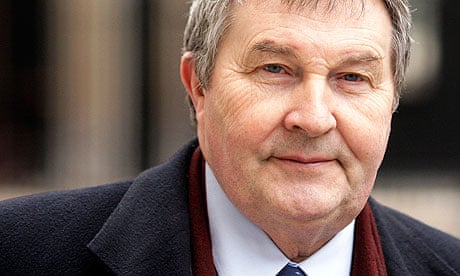Britain's largest trade union, Unite, is facing a "golden goodbye" pay row after its former leader was paid more than £500,000 last year, including a £361,000 severance payment.
Derek Simpson, 66, who stepped down as joint general secretary last year, received the payout as his successor was attacking the government for overseeing "obscene" remuneration at state-owned companies such as Royal Bank of Scotland.
According to Unite's annual return for 2010, Simpson received £510,659, the bulk comprising of £361,347 in severance pay. He also received £97,677 in gross salary, and more than £51,000 in housing benefit and car allowances.
Simpson's colleague and joint general secretary, Tony Woodley, did not receive a payoff and was paid a total of £136,289. He is still employed by Unite on £20,000 a year.
Simpson and Woodley's successor, Len McCluskey, said he was shocked by the payment. But he stressed that Simpson's payoff was drawn up under the financial system used by the Amicus union, which merged with the T&G in 2007 to form Unite. The Amicus and T&G finance functions were not combined until late last year.
"It was absolutely unbeknownst to me or the Unite executive," said McCluskey. "It occurred under a different regime with a union that no longer exists and operated under different governance."
At a meeting on Monday, Unite's executive requested a legal opinion on the settlement, although it is understood that the payoff follows precedent for previous Amicus leaders.
McCluskey said there would be no similar payments under his regime, but the union was powerless to intervene in Simpson's case. "It is inappropriate but there is little that I can do about it. There will be no such agreements in Unite going forward." Technically, it is not within our jurisdiction. This is a decision taken by a previous union and therefore we can do nothing other than pass comment and make certain that Unite does not engage in such practices."
McCluskey is a critic of bankers' bonuses and in January said: "As ordinary workers cope with fuel and food price rises, these obscene and unfair rewards are a reminder that in Cameron's Britain, we really are not all in this together."
He admitted that the revelation could damage Unite's standing in the debate over public spending cuts. "There is no doubt that it will not be viewed in a favourable light by our members or potential members.
"We have to get the message across that this happened in a previous union. This is a new union with a new vision and new, democratic ways of operating. And we are committed to working in a proactive way with working people."
Unite's return shows that the union has 1.5 million members, of whom only 1.2 million pay subscriptions. Woodley's concern over faltering membership has seen him take a new full-time post as the executive officer for organising. This week McCluskey announced plans to launch a cut-price "community membership" for students and the unemployed in a riposte to David Cameron's big society policies.
According to the return, Unite generated an income of £141.6m last year but spent £171.9m, pushing the union into a deficit of £30.2m.
Simpson could not be reached for comment. His last year in office was dominated by the battle between British Airways and its cabin crew, which saw 22 days of strikes and cost the carrier £150m. Simpson infuriated BA at one point in negotiations by sending out live twitter updates. At the time Woodley described the tweets as "unfortunate, to say the least".

Comments (…)
Sign in or create your Guardian account to join the discussion